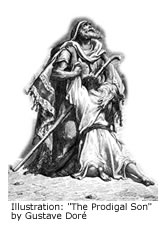by Rev. Ben Eder
 Sunday, June 15, is Father’s Day. A familiar Bible text regarding fathers is the Parable of the Prodigal Son. Although this story is usually told from the perspective of the “lost son,” what about the father in the story? What was his responsibility? And how does he respond to the wanderings—and return—of his son?
Sunday, June 15, is Father’s Day. A familiar Bible text regarding fathers is the Parable of the Prodigal Son. Although this story is usually told from the perspective of the “lost son,” what about the father in the story? What was his responsibility? And how does he respond to the wanderings—and return—of his son?
The word prodigal means being “rashly or wastefully extravagant,” or “giving in abundance.” With those definitions in mind, the father could be said to be “prodigal,” too—generous in bestowing mercy and grace upon his wayward son.
The parable is found in Luke 15:11–32. Please read it first; then answer the following questions.
According to verse 12, the younger son asks for his portion of his father’s estate. Under Mosaic law, the younger son was entitled to one-half of what the older son would receive (Deut. 21:17). When the younger son asks for his portion, what, in effect, is he saying to his father?
__________________________________
__________________________________
The son goes off to a “far country,” where he spends his money in extravagant living. Broke and despondent, he comes to his senses. What conclusion does he come to (vv. 18–19)?
__________________________________
__________________________________
When the father sees his son approaching, what does he do (v. 20)?
__________________________________
__________________________________
By providing a robe and other accessories, and throwing a party, what is the father saying to his son (vv. 22–24)?
__________________________________
__________________________________
The older son is indignant. He protests the gracious treatment his brother is receiving. He refuses to call him “my brother,” instead referring to him as “this son of yours.” The older son probably represents the Pharisees and other self-righteous individuals who believe they earn God’s favor through their character or works (see Luke 15:2). Rather than chastising his older son, what does the father say to him (vv. 31–32)?
__________________________________
__________________________________
The father’s reaction to his younger son’s return is in line with what Jesus says about the sheep that strays but returns. What happens in heaven when the repentant sinner returns to the fold (Luke 15:4–7)?
__________________________________
__________________________________
The graciousness of the father in this parable reflects the disposition of the heavenly Father toward His children. In fact, Scripture uses the word Abba (Aramaic for “Father”) to describe the loving nature of God (see Mark 14:36; Rom. 8:15). Do you view God as “Father”?
__________________________________
__________________________________
The father in the Parable of the Prodigal Son shows us how God the Father relates to His children. God is merciful, for He does not give us what we deserve (His wrath and punishment for sin), and He is gracious, for He gives us what we do not deserve (forgiveness and restoration through faith alone in Jesus Christ).
Although this parable speaks to all people, it contains a special message for earthly fathers: What kind of father are you? Do you reflect the love of the heavenly Father, or do your children see something else? May the love of God be found in all earthly fathers!


